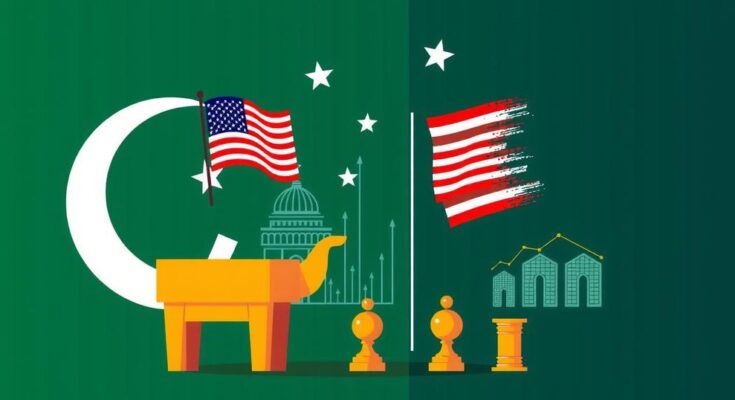The US presidential elections present significant implications for Pakistan’s economy, with candidates Trump and Harris proposing differing economic strategies that could impact trade, tariffs, and investment. The US is a vital export market for Pakistan, making any shifts in policy critical. The candidates’ approaches to corporate taxes and purchasing power also hold potential consequences for Pakistani exports, emphasizing the need for the country to address internal challenges to fully benefit from these changes.
The economic strategies proposed by US presidential candidates, Donald Trump and Kamala Harris, signal important implications for Pakistan’s economy. While both focus on strengthening middle-income groups, their methods diverge significantly. The United States serves as a vital market for Pakistani exports, comprising nearly 20% of the total exports in 2023. Thus, any alteration in US economic policies could substantially influence Pakistan’s trade dynamics. Despite this export relationship, US foreign direct investment (FDI) in Pakistan is relatively minimal, accounting for only 4% of total FDI in FY24. Furthermore, Pakistan’s economic reliance on institutions such as the World Bank and the International Monetary Fund (IMF), where the US holds considerable sway, underscores the importance of US policymaking for Pakistan’s economic stability. Trump’s proposed trade policies include substantial tariffs, which may directly impact Pakistan’s textile exports, a sector already facing competitive disadvantages. Currently, Pakistan receives no preferential treatment under trade agreements that favor its competitors, particularly those in Central America. Harris appears to present a more accommodating approach, suggesting that her administration would avoid imposing new tariffs that could burden Pakistani exports further. Both candidates aim to enhance American purchasing power through targeted fiscal policies, potentially increasing demand for goods such as apparel from Pakistan. Harris has outlined a robust plan to raise the child tax credit, while Trump proposes to lower credit card interest rates. However, experts assert that the overall impact of these measures on Pakistan’s exports could remain limited. Regarding corporate taxes, Harris advocates for an increase to 28%, likely hindering US investments in Pakistan, whereas Trump’s strategy favors lower rates, aiming to stimulate production domestically. Such changes could deter import demand, thereby affecting Pakistan’s economic growth. In the context of the US-China trade tensions, opportunities exist for Pakistan to become an alternative investment destination. Regrettably, the country has previously struggled to capitalize on similar situations due to bureaucratic challenges and security concerns. Experts maintain that without substantial reforms, including the establishment of functional Special Economic Zones, Pakistan may find it difficult to attract foreign investments or shift production from China.
The relationship between the United States and Pakistan is multifaceted, rooted in trade and investment dynamics that significantly affect Pakistan’s economy. The US is a critical market for Pakistani exports, particularly in textiles, while also being an influential player through its monetary and trade policies via the World Bank and IMF. The potential changes in US presidential policies could reshape economic prospects for Pakistan, depending on how each candidate chooses to approach trade relations, tariffs, tax laws, and corporate investment strategies.
In summary, the forthcoming US elections have the potential to dramatically reshape Pakistan’s economic landscape. The differing visions of Trump and Harris encapsulate the challenges and opportunities for Pakistan. While trade agreements and tariffs present hurdles, there remains the possibility for increased purchasing power and altered foreign investment dynamics. However, for Pakistan to truly capitalize on these changes, it must address its internal structural issues and enhance its investment attractiveness to partners both domestic and international.
Original Source: www.dawn.com




